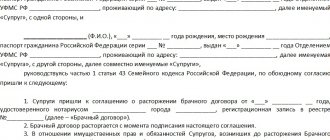Divorce: concept, moment
Divorce is one of the grounds for ending a marriage and differs from others in that it occurs by will:
- husband or wife;
- or both spouses,
- or guardian of an incapacitated husband or wife.
Divorce can be carried out:
- In the civil registry office (registry office), when there is consent of the husband and wife and there are no minor children.
- Court, when spouses have children under 18 years of age, or one of the spouses does not agree to terminate the relationship. Read more in the article How is divorce carried out in court?
Depending on the body that carried out the divorce, the moment of termination of the marriage in accordance with Art. 25 of the Family Code of the Russian Federation (hereinafter - FC) is:
- registration of divorce in the civil registration book;
- entry into force of the court decision (in this case, the court decision is sent to the registry office to register the divorce).
In any case, until a divorce certificate is received, the ex-husband and wife do not have the right to enter into a new union.
What does divorce mean?
The termination of family relations and the rights and obligations arising from them is a divorce of the spouses. Official registration is required both for conciliation of divorce and for judicial implementation of divorce proceedings. But a divorce does not end all the rights and obligations of the spouses, but only part of them.
Spouses who are planning to divorce must understand which legal relationships are terminated and which ones arise. Let's try to briefly understand the issue.
Legal consequences of divorce
The legal consequence of divorce is the termination for the future of personal and property legal relations that arose between husband and wife in marriage. Let's highlight the main points:
- from the moment of registration of the divorce, the newly acquired property is not subject to the regime of joint ownership;
- existing joint property can be divided by agreement of the parties or in court if there is a dispute;
- if there are minor children, the issue of which parent they will live with is resolved in court (clause 2 of article 24 of the Family Code);
- after 300 days from the date of divorce, the presumption of paternity established by paragraph 2 of Art. 48 of the Family Code, which states that the husband of the mother of the born child is recognized as the father of a child born in marriage;
- in the cases established in Art. 90 SK, husband or wife have the right to receive funds (alimony);
- The court also determines the amount of alimony paid by the other parent for the maintenance of children.
Next, we will consider these consequences of divorce in more detail.
Termination of rights, except personal and property rights
With the dissolution of a marriage, spouses lose the right to:
- receiving an inheritance by law after the death of a former spouse;
- the right to pension benefits in connection with the loss of a spouse on grounds established by law;
- the right to receive insurance compensation;
- the right to receive social or departmental benefits;
- the right to reside in residential premises that are personally owned by the other spouse;
- termination of the marriage contract.
Division of jointly acquired property
By virtue of paragraph 1 of Art. 33 of the Family Code, joint ownership is the legal regime for the property of a husband and wife. Another regulation of property rights may be provided for in a marriage contract, but we will dwell on it a little later.
Property acquired jointly includes:
- Income of the husband and wife, including pensions, benefits, etc. An exception is payments that have a specific purpose, for example, money paid in connection with loss of incapacity due to damage to health.
- Immovable and movable things acquired at the expense of common funds.
- Other property acquired by a husband and wife during marriage, regardless of whose name it is registered in.
Divorce is one of the grounds for the division of such property (Clause 1, Article 38 of the Family Code). The common property of the spouses can be divided:
- With the consent of the husband and wife by drawing up an appropriate agreement, which must be certified by a notary.
- Court in case of disagreement. Read more about this in the article What is the procedure for dividing property through the court? A demand for division can be filed within 3 years from the date of divorce.
How housing purchased using maternity capital will be divided during a divorce, read our article “How maternity capital is divided during a divorce.”
You can find more complete information on the topic in ConsultantPlus. Full and free access to the system for 2 days.
Order
The course of action directly depends on the situation that happened in the family. There are 2 options worth considering:
- divorce through judicial proceedings;
- contacting the registration authorities.
Most cases are dealt with in court. The parties will have to prove their positions and justify their demands. The judge’s task is to make the right decision that protects the interests of both spouses and children (if any). Couples who do not have minor children and have no claims against each other contact the registration authorities. You will have to pay a state fee in both cases.
Features of divorce through court
Appeal to the court is required in the following circumstances:
- The husband or wife is against the severance of the marital relationship and obstructs the divorce process. According to the law, such actions are illegal. Marriage is a voluntary union. Being forced to be with someone is unacceptable. Despite the legal right to obtain a divorce, only 2 parties by mutual consent can submit an application to the registry office. Otherwise, the judge decides the problem.
- Spouses cannot divide joint savings and common property. The judge will try to give each party half of the property and funds.
- The parties are unable to decide with whom the child will live. In court, the arguments of the plaintiff and the defendant are heard. If we are talking about a teenage child (over 10 years old), then his opinion will be taken into account when making a decision. Adult children who have reached the age of 18 have legal capacity and have the right to live with whomever they want.
- A husband and wife took out a loan while married, but now they cannot decide who will repay it and in what shares. If it is not possible to find a compromise, the issue will be regulated by Article 9. Family Code. By law, loan obligations will be assigned to both parties in equal shares. The debt will be distributed in court in the presence of the creditor.
- The spouses came to the conclusion to file a joint application for divorce with the registration authorities, but one of them constantly avoids going forward. This kind of behavior is unacceptable. The second spouse has the right to file a claim in court if the incident repeats.
The plaintiff will be required to substantiate the statement of claim. If one of the parties cannot participate in the dispute, then the appointment of a representative is allowed. A power of attorney is issued for him and certified by a notary.
The judge will try to reconcile the parties if there are no valid grounds for divorce. Typically, spouses are given 3 months to resolve the problem peacefully. If a compromise is not found, a hearing on the case will begin. The trial will take place in one of two ways:
| Option for the development of events | Description |
| By consent | The claim is filed by spouses who have children together and there are no disagreements regarding the division of property. |
| Controversial order | An application to the court is submitted by one of the spouses, since the other is against divorce. |
The process of resolving controversial issues can last up to 1.5 years. If there are no particular disagreements and there is a clear desire to get a divorce, the proceedings will take no more than 30 days.
Once a decision is made to dissolve the marital relationship, the rights and obligations of the husband and wife become invalid. The exception is some obligations, for example, debt or child care. Issues related to the division of property must be resolved during the trial of the case in court. If such requirements are not put forward, then the property will remain common.
Instructions for breaking up a marriage in court
A kind of “cheat sheet” (algorithm of actions) for a person who wants to file a claim for divorce is given in the table:
| Stage | Description |
| Preparation of documentation | The plaintiff must competently draw up a statement of claim, justify it, collect evidence and a list of documents required by the court. |
| Receiving a request | The collected documentation is provided to the court office. It is then processed and a hearing date is set, which the parties will be notified of by sending summonses. |
| Hearing the case | The proceedings may not stop for a long time (several hearings) depending on the severity of the situation and the number of controversial issues. If the parties have firmly decided to divorce and the judge cannot give a reason for granting a conciliation period, then the procedure will be accelerated. Difficulties arise if one of the spouses is against divorce or the man and woman are parents of minor children. |
| Court verdict | The judge will make a decision after analyzing the controversial issues or immediately after the first hearing (conciliation period). |
The application is submitted to the magistrate or district court. Cases up to 50 thousand rubles are heard in the first instance. concerning couples with young children who have mutually agreed to end their marriage.
Disputes are heard in the district court. The claim is filed at the place of residence of the defendant. If the plaintiff has minor children in their care or health problems, then the hearing may be rescheduled.
Along with the application, it is necessary to present to the court an identity card, a certificate of marriage and birth of common children, and a receipt confirming payment of the state fee. In order to avoid the conciliation period, the defendant is allowed to submit consent to divorce. If there are disputes regarding alimony, both parties must provide proof of employment.
Features of the divorce procedure through the registry office
If there are no grounds for applying to the courts, spouses who wish to divorce are required to submit a joint application to the registry office. You must personally participate in the process. It is unlawful to ask other people to represent interests even with a notarized power of attorney. Divorce through the registry office has the following advantages:
- there is no need to discuss personal problems in outside society;
- there is no need to substantiate the statement;
- The review period usually does not exceed 1 month.
Divorce without litigation is allowed in the following situations:
- Persons who wished to submit documents for severance of marital relations had no questions left for each other regarding property, debts and other issues.
- The spouses are not parents of minor children.
Instructions for divorce through registration authorities
The algorithm of actions for divorce through registration authorities is usually as follows:
- The spouses submit an application.
- State duty is paid.
- The documentation attached to the application must be submitted.
- A divorce certificate is issued.
You need to submit to the registry office an application prepared by 2 spouses or each of them separately. Documents are submitted on the same day. If the husband or wife is unable to come, then consent to divorce can be conveyed through another person. The document will have to be certified by a notary so that registration authorities can verify its authenticity. The following documents are attached to the application
- identification;
- a document confirming payment of the state fee;
- marriage certificate.
Sometimes it is necessary to submit other documents to the authorized bodies, for example, a court verdict declaring a person missing (dead) or a certificate confirming the fact that a spouse has been imprisoned. A package of documents is compiled individually in each case. You can first consult with the registry office at your place of residence.
Debt section
In addition to property, debts that arose during the family life of the spouses are subject to division, provided that the money received was spent on the needs of the family (Clause 2 of Article 45 of the Family Code). The burden of proving these circumstances lies on the party that wants to distribute the debt (clause 5 of the Review of Judicial Practice of the Armed Forces of the Russian Federation dated April 30, 2016 No. 1).
Such debts include:
- funds received under a targeted loan and spent on the purchase of an apartment (determination of the Kemerovo Regional Court dated March 24, 2015 in case No. 33-2185/2015);
- funds received under a loan agreement for which an apartment was purchased (decision of the Moscow Regional Court dated June 22, 2015 in case No. 33-14747/2015);
- money received under a loan agreement for which a car was purchased (decision of the Bogorodsky City Court of the Nizhny Novgorod Region dated March 28, 2017 in case No. 2-560/2017).
Grounds, reasons and conditions
The grounds for termination of marriage are provided for in Article 16 of the Family Code of the Russian Federation:
- Death of one of the spouses.
- Announcement by the court that the spouse is declared dead.
- Dissolution of marriage (divorce).
When these legal facts occur, the marriage is considered terminated.
The procedure for divorce in the registry office and in court
During the life of both spouses, there is also a possibility that the marriage will stop. Regardless of why the couple decided to separate, divorce occurs under certain conditions and within the framework of the law - by applying to the registry office or court.
Divorce through the court occurs if there are joint children under 18 years of age or disputes regarding property.
If there are minor children in the family, the spouses will be divorced only in court
If this is a judicial divorce, then within three days after the decision enters into legal force, the court sends an extract from this decision to the registry office where the registration took place.
Differences between ending a marriage and dissolution
Divorce is the result of an expression of will. This is possible with the consent of one or both parties. The end of a marriage is a situation that does not always depend on the will of people. For example, in the event of the death of one of the spouses, the other has to put up with the termination, because it is impossible to be in union with a person who is no longer there. But divorce is one of the grounds, therefore these concepts are interconnected; divorce is a special case of the end of a marriage.
Some widows, after the death of their husband, continue to wear a wedding ring on their ring finger for the reason that death is not a divorce: they did not give consent, they did not express their will to do so
Is it possible to end an invalid marriage?
An invalid marriage is an officially registered marriage concluded in violation of conditions and laws. Such a union does not imply a legal relationship, and responsibilities are not assigned to anyone. A marriage can be considered invalid from the moment it is legally recognized as such.
Only a valid marriage concluded in compliance with legal norms can be dissolved. Therefore, the bond of an invalid marriage cannot be terminated.
Division of property in the presence of a marriage contract
If the parties are not satisfied with the legal regime of property, they can establish other rules by drawing up a marriage contract. It is drawn up in writing and must be certified by a notary. The document can be drawn up:
- during any period of marriage;
- before marriage.
In the latter case, the contract comes into force from the moment the spouses enter into marriage.
In accordance with paragraph 1 of Art. 42 of the Family Code, spouses can stipulate in the contract the property that each of them will receive in the event of a divorce. For example, it may be established that property acquired during marriage that is subject to registration (vehicles, residential buildings, apartments, land plots, etc.) belongs to the spouse in whose name it is registered (determined by the Moscow District Court of St. Petersburg dated 06/05/2017 in case No. 11-146/2017).
If there is a valid marriage contract, the division of property is carried out in accordance with the rules established by this document.
IMPORTANT! During marriage, you can conclude not only a prenuptial agreement, but also an agreement on the division of jointly acquired property. Unlike a marriage contract, a division agreement does not establish ownership regimes, including in advance, for property that has not yet been acquired, but only stipulates who owns what the spouses already have and under what conditions.
Family property
The first thing that stops upon divorce (or earlier, if established by the court) is the accumulation of family property. If a marriage contract is not concluded, then all property acquired during marriage is divided between the spouses, regardless of:
- official registration of property - even if the property is registered in the name of one spouse, both actually own it;
- spouse's income - all earnings in the family are considered common.
Of course, the property section has its own peculiarities, which the site’s lawyer will tell you about, but basically this is how the section works. Even if the spouses buy something the day before the divorce, it will be considered family property, and it is very difficult to prove otherwise. But purchases made after a divorce are the personal property of the person who made them.
Disputes about the place of residence of children arising during divorce
If, after a divorce, the parents of minor children live separately, the court (Article 24 of the Family Code) resolves the issue of who the children will live with in the future. The mother and father can establish this by putting the agreement in writing. If there is a disagreement, the issue is resolved by the court.
When considering disputes about children, it is mandatory to involve the guardianship and trusteeship body, which conducts an examination of the living conditions of the spouse (spouses) applying to raise a minor, and issues an appropriate conclusion (clause 3 of the resolution of the Plenum of the Armed Forces of the Russian Federation dated May 27, 1998 No. 10, hereinafter - Resolution No. 10).
The court when resolving such disputes in accordance with paragraph 3 of Art. 65 IC takes into account:
- age of the minor;
- the opinion of a child who has reached the age of 10 (Article 57 of the Family Code);
- relationships between child and mother, between child and father;
- child's attachment to mother and father;
- personal qualities of each parent;
- conditions available for the upbringing and development of a minor (working hours of the father or mother, income level, etc.).
At the same time, the advantage of the mother or father in financial and living conditions is not an unconditional basis for making a decision (clause 5 of Resolution No. 10).
List of required documents
To obtain a divorce certificate, you must provide the following documents to the registry office:
- A joint statement of the spouses about the desire to dissolve the marriage relationship (or separate statements from each spouse, one of which will be notarized, due to the inability of the spouse to appear in person at the registry office). The application must contain the personal and contact information of each party, details of the marriage certificate, details of passports (or other identification documents), and an indication of the surnames left after the divorce.
- A copy of the court decision declaring the second spouse incompetent, missing, or sentenced to more than 3 years.
- Extract from the court decision declaring the marriage dissolved.
- Receipt for payment of state duty. At the moment, the state duty is 400 rubles, paid by each party.
In this case, the fee is payable only by the applicant. The second spouse or the person representing his interests must be notified of the filing of an application for divorce.
Disputes about the exercise of parental rights after divorce
In accordance with paragraph 1 of Art. 61 SK mother and father have equal rights to raise their children. However, when parents divorce or move away, a dispute often arises related to the ability of a parent living separately to exercise their parental rights.
In accordance with paragraph 8 of Resolution No. 10, when resolving such disputes, courts must take into account:
- age of the minor;
- child's attachment to mother and father;
- his state of health;
- other circumstances affecting the physical and mental health of the child.
The operative part of the decision determines the procedure for communication between a minor and a parent living separately, namely: place, time, duration, etc.
Failure to comply with a court decision or creating obstacles to its execution by the mother or father with whom the child lives may become grounds for transferring the child to a parent living separately.
In cases where communication between a minor and a mother or father living separately could cause harm to the child, the court may deny such parent communication.
Divorce and children
Obligations regarding common children do not disappear upon divorce. The parent, even if he does not live with the child, is obliged to support him. Financial support is expressed in the form of alimony payments, but the parent has the right to make purchases for the child, give him gifts and provide other material assistance.
A child born in the first 300 days after a divorce is “automatically” registered in the name of the ex-husband, which results in material obligations to him. Therefore, lawyers advise men not to delay the divorce process, otherwise they will have to challenge paternity.
Moskvich A. divorced his wife in mid-March 2020. And in November of the same year, his ex-wife gave birth, and A was recognized as the father of the child. The woman demanded that he pay child support. However, the man not only did not know about his ex-wife’s pregnancy, but was also sure that the child was not his, since the relationship ended in October 2017 precisely because of suspicion of infidelity. A. turned to a lawyer for assistance, who was able to prove in court that the child of A.’s ex-wife is not a biological descendant of the plaintiff.
Every family law lawyer pays attention: after the marriage ends, parental rights and responsibilities continue. Of course, the court (or the spouses themselves) determines the place of residence of the child and the parent with whom he will live
But the second parent has the right to exercise his parental rights to the extent specified by law. That is, he has the right to see the child, raise him, receive information from institutions and departments, and also retains the benefits provided for parents. If the parent with whom the child lives prevents communication, you can go to court or bailiffs.
Alimony paid for child support
In accordance with paragraph 1 of Art. 80 SK mother and father must support their children who have not reached the age of majority. In the absence of a formalized agreement on the payment of alimony, the dispute is resolved by the court.
The amount of maintenance established by law is:
- ¼ earnings for 1 child;
- 1/3 - for 2 minors;
- ½ earnings for 3 or more children.
Decree of the Government of the Russian Federation dated July 18, 1996 No. 841 established the following list of income from which funds for child support are withheld:
- all types of wages, bonuses and other remuneration;
- all types of pensions, with the exception of payments made in the event of the loss of a breadwinner;
- scholarships paid to students, graduate students, doctoral students, students of theological seminaries;
- income from the transfer of property for rent;
- dividends accrued on shares, shares, other income from participation in the management of a legal entity;
- monetary allowances for military personnel, etc.
If the parent does not have a permanent income or its irregularity, the court may determine the monthly amount of payments in a fixed amount.
If a child has an injury or serious illness, or the need to care for him, the mother or father may be required to bear additional expenses - both those that have already occurred and those that will arise in the future (Article 86 of the Family Code).
General information
In short, after marriage, the husband and wife have the same rights to raise children and to joint property. Naturally, spouses can independently determine each other’s rights and obligations by drawing up a marriage agreement. And when carrying out a divorce, they are obliged to comply with the terms of the contract. But if there is no such document, then the division of property must occur according to law.
Divorce usually occurs on the initiative of:
- both spouses;
- one of them;
- a third party (for example, a guardian if the husband or wife is incapacitated).
If the case is considered by the court, then you can appeal within 3 years. The date from which the countdown is based, in this situation, may be not only the date of divorce, but also the date the plaintiff discovered a violation of his rights. For example, the ex-spouse hid the presence of property that is considered common. And even if several years have passed since the date of divorce, the injured party has the right to go to court.
Divorce without the participation of husband or wife
Divorce in court is possible unilaterally. The court informs both parties about the date of the hearing. If the plaintiff or defendant ignores 3 hearings in a row without notifying authorized persons of the reason for failure to appear, then after 2-3 months the court will grant a divorce. Termination of the case is permissible only with mutual consent or the absence of both spouses during the hearing.
To avoid lengthy dispute resolution, lawyers advise discussing issues related to common children and jointly acquired property in advance. The compromises reached must be documented and attached to the claim:
- An agreement on the division of property is relevant in the absence of a marriage contract and in the presence of joint property.
- An agreement containing information about the child’s place of residence and the procedure for communicating with parents after a divorce.
- An agreement on the payment of alimony is drawn up by spouses in order to independently determine the amount of alimony and other issues related to the maintenance of the child.
Documents should be drawn up in a notary office to give them legal force. The notary will check the agreements for errors, provide ready-made samples and forms, and answer questions of interest to the spouses.








